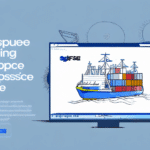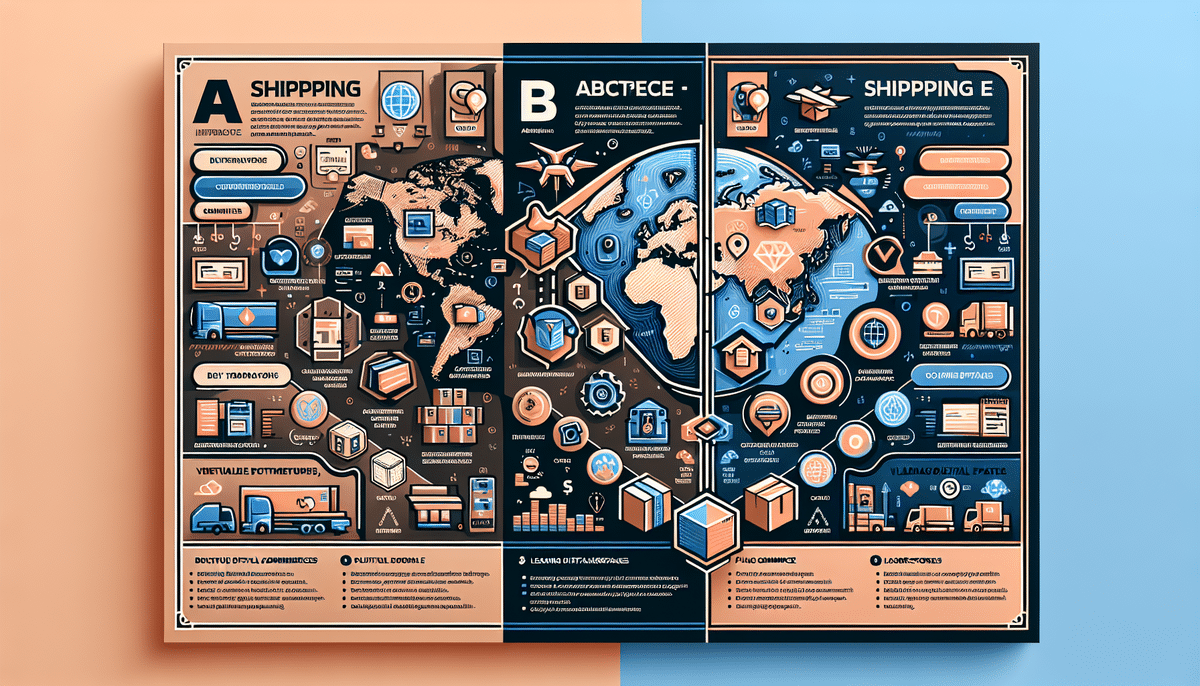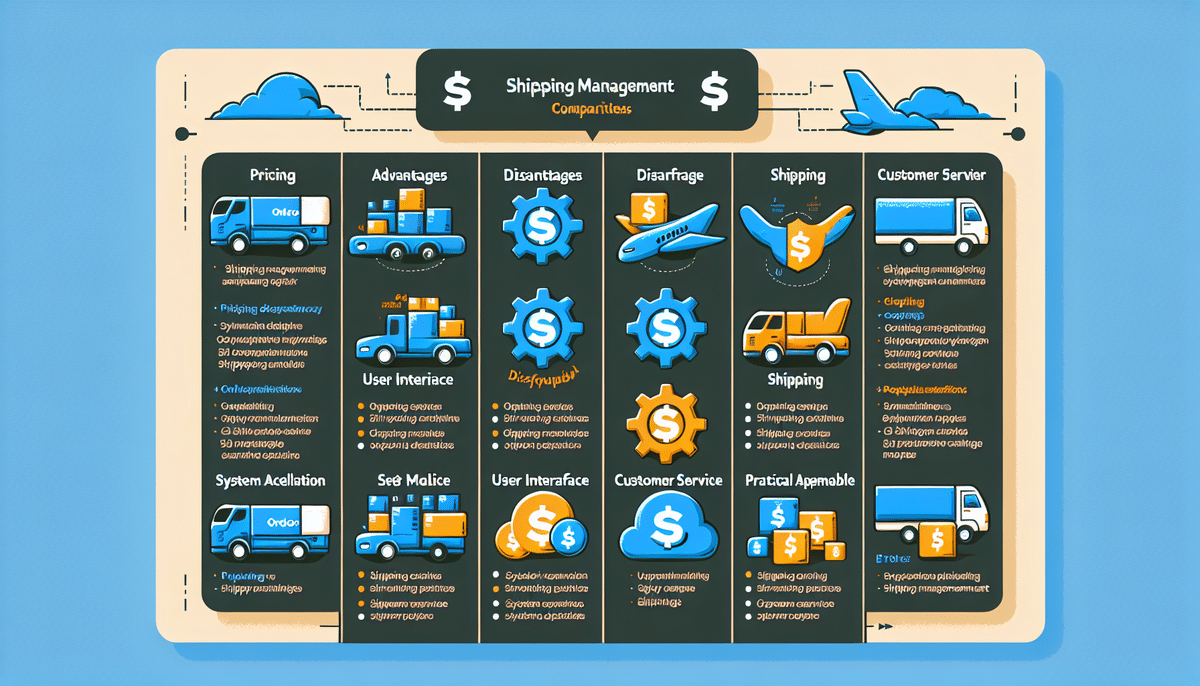Easyship vs ShipStation: Which Shipping Software is Right for Your E-Commerce Business?
Shipping is a critical component of any e-commerce business, but managing it can be complex and time-consuming. Fortunately, shipping software solutions like Easyship and ShipStation simplify this process, allowing businesses to streamline their shipping operations. This comprehensive comparison explores the differences between Easyship and ShipStation, focusing on their user interfaces, features, pricing, integrations, and customer support. By the end of this article, you'll be equipped to choose the platform that best fits your business needs.
Introduction to Shipping Software
Shipping software plays a vital role in managing the logistics of e-commerce businesses. It assists in tasks such as printing shipping labels, tracking packages, and handling customs documentation. According to a 2023 Statista report, global e-commerce sales are projected to reach $6.54 trillion by 2023, highlighting the growing importance of efficient shipping solutions.
One of the primary advantages of using shipping software is the ability to compare shipping rates from multiple carriers, ensuring businesses choose the most cost-effective option for each shipment. Additionally, these platforms provide valuable data and analytics on shipping performance, enabling businesses to optimize their shipping strategies and reduce costs.
Overview of Easyship
Easyship is a cloud-based shipping platform designed to simplify the shipping process for e-commerce businesses. It connects users with over 100 shipping carriers worldwide, allowing for easy comparison of rates and delivery times. Key features of Easyship include:
- Automated customs forms
- Real-time shipping tracking
- Dashboard for managing shipments from a single location
- Access to discounted shipping rates
- Integration with popular e-commerce platforms like Shopify, WooCommerce, and Magento
Easyship also offers tools for marketing and sales, as well as detailed analytics and reporting features to help businesses monitor their performance and identify areas for improvement.
Overview of ShipStation
ShipStation is another leading shipping software that provides a range of tools to manage shipping operations efficiently. It is known for its robust integration capabilities with multiple marketplaces and shopping carts, including Amazon, Etsy, and Shopify. Key features of ShipStation include:
- Label printing and tracking
- Advanced reporting and analytics
- Customizable shipping rules
- Mobile app for on-the-go management
- Integration with over 100 e-commerce platforms and carriers
ShipStation's mobile app extends its functionality, allowing businesses to manage their shipping operations from anywhere, enhancing flexibility and responsiveness.
Similarities Between Easyship and ShipStation
- Both platforms allow users to print shipping labels and track shipments in real-time.
- Integration with multiple marketplaces and shopping carts for seamless order import.
- Tiered pricing plans based on the number of shipments per month.
- Support for a wide variety of shipping carriers, enabling rate and delivery time comparisons.
- Comprehensive shipping analytics and reporting to monitor costs and performance.
Overall, Easyship and ShipStation offer robust solutions that cater to the shipping needs of e-commerce businesses, helping them save time and reduce shipping costs.
Differences Between Easyship and ShipStation
Despite their similarities, Easyship and ShipStation have distinct differences that may influence your choice:
- User Interface: Easyship features a modern and intuitive design that's easy to navigate, whereas ShipStation has a more traditional interface that might be overwhelming for beginners.
- Features: Easyship offers a broader range of features, including automated customs forms and extensive carrier options. ShipStation, on the other hand, excels in advanced reporting and customizable shipping rules.
- Pricing: Easyship's pricing is generally more affordable, ranging from free to $99 per month, while ShipStation's plans range from $9 to $159 per month. However, Easyship may charge additional fees for specific features like duties and taxes calculations.
- Integrations: ShipStation integrates with a larger number of e-commerce platforms and carriers, making it a versatile choice for businesses operating on multiple platforms. Easyship primarily focuses on integrations with popular platforms like Shopify and WooCommerce.
- Customer Support: Easyship offers 24/7 customer support via live chat and email. In contrast, ShipStation provides phone support during business hours and email support outside those times.
Pricing Comparison
Choosing the right pricing plan depends on your business volume and specific needs:
- Easyship: Offers plans ranging from free to $99 per month. The free plan includes basic features, while higher-tier plans offer additional functionalities like advanced analytics and priority support.
- ShipStation: Pricing plans range from $9 to $159 per month, based on the number of shipments processed. Higher-tier plans unlock advanced features such as enterprise-level integrations and enhanced support options.
While Easyship appears more budget-friendly, it's essential to consider additional fees for features like duties and taxes calculations. ShipStation's higher pricing tiers offer more comprehensive features suitable for larger businesses with more complex shipping needs.
Integrations Comparison
Integrations are crucial for seamless operations. Here's how Easyship and ShipStation stack up:
- Easyship: Integrates with major e-commerce platforms like Shopify, WooCommerce, and Magento. It also offers an API for custom integrations with other third-party applications.
- ShipStation: Boasts integrations with over 100 e-commerce platforms, marketplaces, and carriers, including Amazon, eBay, and Walmart. This extensive integration capability makes ShipStation highly versatile for businesses operating across multiple sales channels.
Additionally, Easyship specializes in international shipping, providing features like customs clearance and tax calculations, which are essential for businesses shipping globally. ShipStation focuses more on domestic shipping, offering fewer international shipping features.
Customer Support Comparison
Reliable customer support can significantly impact your experience with shipping software:
- Easyship: Provides 24/7 customer support through live chat and email, ensuring assistance is available whenever you need it. They also offer a comprehensive knowledge center and a blog filled with tips and best practices.
- ShipStation: Offers phone support during business hours (Monday through Friday, 8am to 8pm EST) and email support outside those hours. Their support is known for being responsive, but it is not available 24/7.
Pros and Cons
Pros and Cons of Using Easyship
- Pros:
- Comprehensive range of features, including international shipping tools
- Access to discounted shipping rates
- User-friendly interface
- Real-time shipping rates
- 24/7 customer support
- Cons:
- Additional fees for certain features like duties and taxes
- Limited customization options compared to ShipStation
Pros and Cons of Using ShipStation
- Pros:
- Advanced reporting and analytics features
- Customizable shipping rules
- Extensive integrations with e-commerce platforms and carriers
- Robust order management system
- Mobile app for on-the-go management
- Cons:
- Steeper learning curve due to a more complex interface
- Higher pricing tiers
- Limited international shipping features
Which Shipping Software is Best for Your Business?
The choice between Easyship and ShipStation depends on your specific business needs:
- Choose Easyship if you:
- Prefer a sleek and intuitive user interface
- Require a wide range of shipping features, including international shipping
- Are looking for more affordable pricing options
- Operate primarily on platforms like Shopify or WooCommerce
- Choose ShipStation if you:
- Need advanced reporting and analytics
- Require customizable shipping rules to fit specific business processes
- Use multiple e-commerce platforms and marketplaces
- Prefer a robust order management system with extensive integrations
Conclusion: Making the Final Decision
Both Easyship and ShipStation offer powerful tools to enhance your e-commerce shipping operations. Easyship stands out with its user-friendly interface and comprehensive international shipping features, making it ideal for businesses looking to expand globally. Conversely, ShipStation excels in advanced analytics and extensive integrations, catering to businesses that operate across multiple sales channels and require detailed shipping management capabilities.
By assessing your business's specific needs, such as the importance of international shipping, budget constraints, and the complexity of your shipping processes, you can make an informed decision on which shipping software will best support your growth and operational efficiency.




















